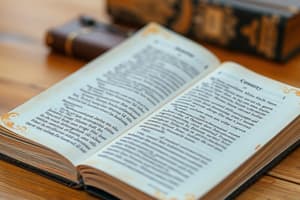Podcast
Questions and Answers
What type of conflict is characterized by a struggle between a character and an opposing individual?
What type of conflict is characterized by a struggle between a character and an opposing individual?
- Character vs.self
- Character vs.society
- Character vs.nature
- Character vs.character (correct)
Which of the following best describes communal values?
Which of the following best describes communal values?
- Values influenced by global trends and international standards
- Values that focus solely on economic success
- Values held by an individual that guide their personal behavior
- Values that are shared among a group or community to promote harmony (correct)
When discussing character vs.nature conflict, which of the following scenarios would be most appropriate?
When discussing character vs.nature conflict, which of the following scenarios would be most appropriate?
- An individual grappling with their inner thoughts and feelings
- A protagonist battling a rival in a competition
- A group advocating for social justice against oppressive laws
- A character struggling to survive in a natural disaster (correct)
In a poem focusing on character vs.society conflict, which emotion might be most effectively evoked?
In a poem focusing on character vs.society conflict, which emotion might be most effectively evoked?
What is an important element to consider for effectively conveying conflict in a poem?
What is an important element to consider for effectively conveying conflict in a poem?
What type of conflict is primarily depicted in the poem, considering the theme of standing alone against societal norms?
What type of conflict is primarily depicted in the poem, considering the theme of standing alone against societal norms?
Which of the following examples best represents an individual value?
Which of the following examples best represents an individual value?
What communal value is reflected by the expectation to conform to societal standards in the poem?
What communal value is reflected by the expectation to conform to societal standards in the poem?
Which emotion might the poem's imagery aim to evoke in its readers regarding societal rejection?
Which emotion might the poem's imagery aim to evoke in its readers regarding societal rejection?
What feature of the poem is essential for illustrating the conflict in vivid detail?
What feature of the poem is essential for illustrating the conflict in vivid detail?
Which type of conflict does the line 'called peculiar, a child of a different tune' best represent?
Which type of conflict does the line 'called peculiar, a child of a different tune' best represent?
What is the intended emotional impact of showcasing rebellion in the poem?
What is the intended emotional impact of showcasing rebellion in the poem?
Flashcards are hidden until you start studying
Study Notes
Types of Conflict
- Character vs. Character: Involves a struggle between two or more characters, highlighting personal differences, goals, or values.
- Character vs. Nature: Features a character challenged by natural forces, depicting survival, adversity, and the impact of the environment.
- Character vs. Society: Centers on a character opposing societal norms, laws, or beliefs, emphasizing themes like injustice and individuality.
Understanding Values
- Value Defined: Fundamental beliefs or principles that guide behavior and decision-making.
- Individual Values: Personal beliefs reflecting an individual’s priorities and moral principles; examples include honesty, loyalty, and independence.
- Communal Values: Shared beliefs or standards within a community that promote collective well-being; examples include equality, respect, and community service.
Conflict Identification
- Determine which type of conflict is highlighted in the poem to frame its thematic exploration within narrative context.
Expression of Values
- Identify specific individual or communal values the poem aims to underscore through the depicted conflict to deepen its meaning.
Imagery
- Consider concrete situations or events that vividly represent the chosen conflict; descriptions should evoke sensory experiences to engage the reader.
Emotional Impact
- Aim to provoke specific emotions or reactions in the audience, such as empathy, anger, or sadness, through the depiction of characters and conflicts.
Structure
- Evaluate the poem's title for its efficacy in encapsulating the essence of the conflict, ensuring it resonates with the themes presented in the text.
Types of Conflict
- Conflict can be categorized into three main types:
- Character vs. Character: External struggle involving interpersonal conflicts between characters.
- Character vs. Nature: Struggles between a character and their natural environment, often depicting survival challenges.
- Character vs. Society: Involves a character's conflict with societal norms, laws, or cultural expectations.
Values
- Value: An important belief or principle guiding behavior and decision-making.
Individual Values
- Individual values reflect personal beliefs that shape one’s identity and actions.
- Examples include:
- Honesty: Valuing truthfulness in interactions.
- Independence: Prioritizing self-reliance and autonomy.
- Compassion: Valuing empathy and kindness towards others.
Communal Values
- Communal values represent shared beliefs within a community that foster cohesion.
- Examples include:
- Respect: Valuing consideration for others’ feelings and rights.
- Justice: Upholding fairness and equality in treatment.
- Traditions: Valuing customs that bond community members.
Conflict Identification in Poetry
- The poem focuses on Character vs. Society conflict, highlighting the struggle against societal norms and expectations.
Expression of Values
- The poem aims to illustrate values such as individuality, rebellion, and self-acceptance through the conflict with societal constraints.
Imagery
- Specific situations in the poem may illustrate the feeling of being an outsider, using vivid imagery to portray isolation and defiance.
- Descriptions might highlight contrasting elements of the character’s unique perspective versus societal norms.
Emotional Impact
- The poem seeks to evoke feelings of empathy, resilience, and hope, encouraging readers to reflect on their perceptions of conformity and individuality.
Structure
- The title should encapsulate the central conflict, offering a glimpse into the themes of rebellion against societal expectations in a concise manner.
Studying That Suits You
Use AI to generate personalized quizzes and flashcards to suit your learning preferences.




